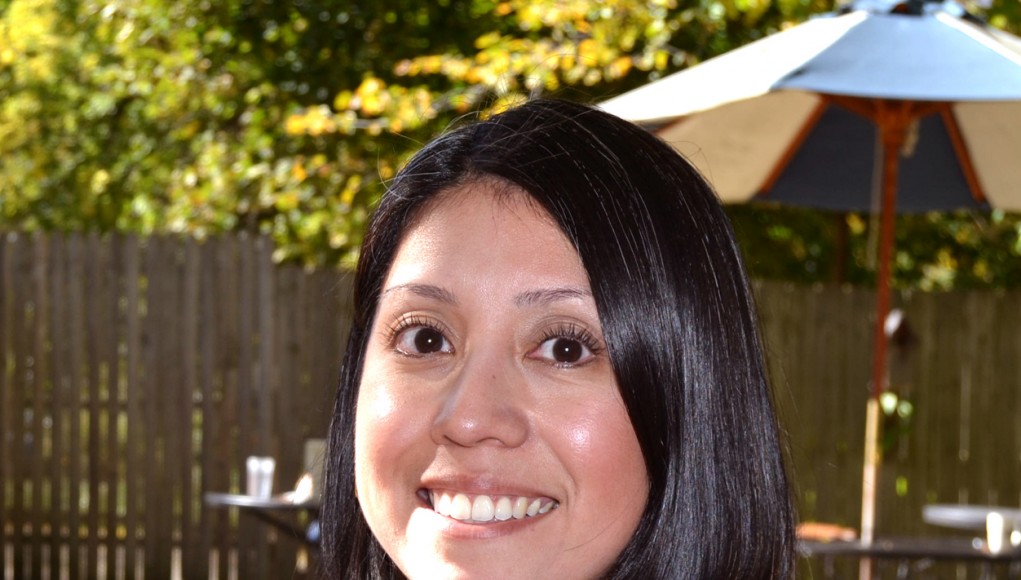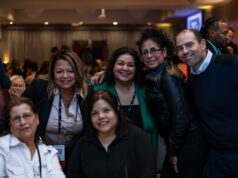Big Brothers Big Sisters of Dane County’s Chief Operating Officer Sandy Morales believes that building solid relationships not only transform young people’s lives, but the whole community.
“You think about one match and you multiply that by 500 or maybe 1,000. How transformational can that be for this community? It already is. We’re seeing it,” Morales tells Madison365. “Big Brothers Big Sisters has been transforming the community for 50 years and we will continue to do that. Our population is going to become more and more diverse and building relationships is going to be at the center of our progress as a city.”
Morales has been the Chief Operating Officer (COO) of Big Brothers Big Sisters since July 1. She’s taking about a year to get to know the organization and put some strategies together with her board of directors and staff with the overall plan to take over as CEO in June of next year, the 50th anniversary of BBBS. “What I really love about Big Brothers Big Sisters is that we are a stable organization. We’ve been matching Bigs and Littles for close to five decades,” she says. “It’s really amazing to know that I am part of a program that is investing in people for a really long time and really making a difference in our community.”
Big shoes to fill
Morales will be succeeding Dora Zúñiga, who spent a decade as CEO of Big Brothers Big Sisters and was instrumental in cultivating the BBBS board’s focus on fundraising as well as modernizing BBBS operations. Zúñiga is well known and respected in the Madison community and has served on several national and regional Big Brothers Big Sisters leadership committees.
“I’ve got big shoes to fill,” says Morales, who was previously development director at BBBS. Before that, she held marketing and fundraising roles at United Way of Dane County. “Dora is a mentor of mine and somebody I really respect. I learned a lot from her about the organization and the mission.”
Big Brothers Big Sisters of Dane County’s mission is to provide children facing adversity with strong and enduring, professionally supported one-to-one mentor relationships that change a child’s lives for the better, forever.

BBBS goes through great detail to make sure that they are matching every child with the right volunteer. “There’s a lot of work that goes into making the right match,” Morales says. “We do have a wait list of about 300 kids. At the end of the day, we need more volunteers.
“It’s a volunteer opportunity for any age … whether you are retired or whether you are at the mid-point in your career, you can do it,” she adds. “You can do it as an individual or as a couple or as a family.
Morales says that the average BBBS match length is 41 months. “That’s more than 3 years,” she says. “Through national research on our Littles who are now adults, they’ve found that Littles who were matched in the program for at least 2 years had greater potential to go on to a four-year college and make incomes of $75,000 or more.
“A great thing about Big Brother Big Sisters that I love is that a child who is mentored through our program is more likely to seek out mentors in the future,” she adds. “They know what it’s like to be mentored. They won’t be afraid to seek out mentors who can help them in the future. I think that’s important because you need mentors through your whole life; you don’t just need mentors when you are a child.”
BBBS now has close to 500 volunteers. “These are talented people. Many of them lead organizations and are tremendous community members,” Morales says, “and they’ve chosen Big Brothers Big Sisters to be the place where they want to make a difference in a child’s life.”
Morales wants to get more men involved on the mentor side of things. Especially men of color. “There are Latino and African American men involved in the program but we don’t see as many as we would like to,” Morales says. “We do need more Latino and black volunteers. The reality is that the people we serve are Latino or black or they are mixed. It true that when kids can see themselves in their mentor – because they look like them, because they went through the same experiences of them – that adds value to that child’s experience and life because they are like, ‘Wow. I can be like my Big Brother or Big Sister!’”
Millennial mindset
At 36, Morales is rather young compared to many of her contemporaries in charge of other large Madison-area nonprofits. She’s borderline Generation Y, although technically Generation X. So far, she says she hasn’t received any negativity for her youth. “I think people are excited to see new blood and someone who is hungry and wants to make an impact on the community. I’ve seen a lot of enthusiasm,” Morales says.
In many ways, Morales does have that millennial mindset. “I think a lot of other people [have that millennial mindset] whether they’re 25, 50, or 65. You don’t have to be of millennial age to think that way. It’s a mindset where you want to share your experiences … where you want to volunteer first before you invest financially,” says Morales, who earned her masters of business administration from Marquette University. “I think there’s a different sense of community and collaboration. The Millennial mindset is more about ‘How do I get other people involved?’ and ‘How do we come together to work on a solution to the problem we are facing?”
There’s no doubt that the mindset of millennials – who will make up 50 percent of the workforce by 2020 — is transforming the way that we do business. “It’s transforming the way businesses market themselves. They are moving from brand positioning to brand authority – like ‘we are the experts,’” Morales says. “That’s the same thing I want to do at Big Brothers Big Sisters. We feel like we are the experts in one-to-one mentoring. We take mentoring very seriously. We want to see the outcomes from mentoring and that requires dedication from volunteers and it also requires a lot of support from the organization to ensure that the mentors and the kids are thriving in the relationship.”
That millennial mindset is also driving the Latino Professional Association (LPA), a group that Morales founded two years ago in Madison to recognize and enhance the lives of Latino professionals through community engagement and professional development. She is currently the LPA president. LPA has numerous millennials in the organization including many that serve on its executive team.

“You do see that mindset in LPA, too, but the reality is that everybody is welcome to the organization,” says Morales, who is also a board member of the Latino Chamber of Commerce of Dane County. “We have a great mix of people at LPA in terms of experienced professionals and emerging young leaders. LPA was something that we wanted to do and needed in this community for a while. It’s a great place to network and to learn from people who have a lot of experience in this community.
“At LPA events, we try to always have a cultural aspect of what we do, too, whether that be music or food,” Morales adds. “We like to say that this is a space that you can share not only your experience as a professional in the workforce but also your culture. You can speak Spanish if you want to. You can talk about where you came from and who your parents are. As Latinos, we all have this history and we all want to share our history and learn about other’s stories.”
Morales’ history involves parents that came to the United States in the ‘70s from Puebla, Mexico and settled in Batavia, Illinois, just outside of Chicago. “It was a learning experience for me. I look back now and I was, like, ‘Wow. That was different for me to grow up being one of three brown kids in elementary school,’” Morales remembers. “It’s funny because before we moved to Batavia, we lived in West Chicago where there was so much diversity.”
Like millions of children of immigrants do every day in America, Morales helped her parents navigate the system whether it be at the bank, the doctor, the grocery store, or parent-teacher meetings. “I had to help my parents out with some things and tell them what to do – you have to go to this meeting or this is what the doctor is saying,” she remembers. “If you’re a child of immigrant parents who has to go through that it’s not typical of what other kids have to go through. But I look at that and I’m like, ‘That’s leadership.’ I feel like more employers should see what’s happening in our communities and what kids are doing in their parents lives. How they sometimes have to lead our parents. That’s a leader right there. Those kids could become great leaders in the future.”
Morales constantly sees kids who have the potential to be great leaders at BBBS. She just hopes that more mentors will see the positives that they get out of being a Big and making a difference in the life of a Little.
“Don’t think about the time; you have to think about the experience,” Morales says. “Going to a football game, making dinner together … there are so many things that you will be doing anyway and now you can share that experience. We have many ideas for activities for you, too. We have staff that are dedicated to making sure you have the best experience with your Little.”
Besides making a tremendous difference in a young person’s life, being a Big is rewarding as you are part of a network of 500 people in this community.
“The greatest thing about being a Big is the network that you become a part of,” Morales says. “We try to incorporate more events for Bigs so they can meet and network with each other because one of the things we find is that they want to find out how others spend time with their Little. And, ‘Oh, by the way, I’m the CEO of this company.’ It’s a great networking opportunity, too.”
A few months into her job, Morales is busy networking, too, and forming the strategic partnerships that she hopes will keep BBBS thriving for the next 50 years. “Whether it’s with other non-profits or with the Madison Police or Fire Departments, I want be strategic with who we are partnering with and who these kids need as mentors,” she says.
“I would love to be able to serve more kids. We serve about 650 children. I want to serve at least 1,000 one day,” Morales adds. “We’ve had the numbers that have shown the positive impact we’ve made on the community. The more young people we can impact, the better it will be for the community.”




























